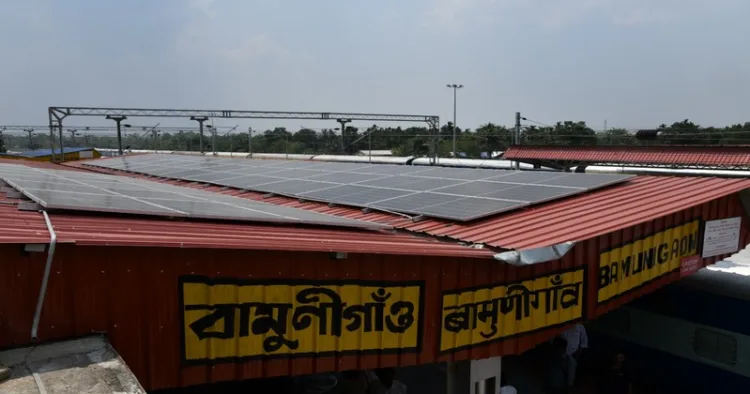Guwahati: N. F. Railways in line with the policy of Indian Railways, are steadily progressing to achieve the target of net zero carbon emissions by the year 2030. In an endeavour to further minimise the dependence on fossil fuels, the Northeast Frontier Railway is adopting various steps to generate more and more green energy by installing Roof-Top Solar power plants in service buildings and other installations spreading across the zone.
Under the ‘Go-Green’ mission, 146 stations and other service buildings under N.F. Railways have already been fitted with solar rooftop panels generating 6747 KiloWatt Peak (KWp) till April 2024, which in turn will save 47.05 lakh units of power. The service buildings and other installations in the state of Assam, West Bengal, Bihar, Tripura, Arunachal Pradesh, Meghalaya & Nagaland are on the list of those contributing towards solar power generation with roof top panels. Division wise, Katihar, Alipurduar, Rangiya, Lumding and Tinsukia are generating 657 KWp, 426 KWp, 925 KWp, 1035 KWp and 207 KWp of solar power, respectively, for their day to day use. The headquarters complex of NFR at Guwahati is also contributing to the generation process with 1497 KWp. The two workshops at New Bongaigaon & Dibrugarh are also have 1000 KWp each installed solar power plants.
Organsier E Poll – Whom will you vote for
During the recently completed Financial Year 2023-24, 18 stations and other service buildings of Assam, Tripura and West Bengal have been fitted with solar roof top panels generating 609 KWp. In the Alipurduar, Rangia & Lumding divisions 20, 220 and 369 locations, respectively, have been fitted with solar roof top power generating panels. Major railway stations like Dhupguri & Falakata under Alipurduar division, Agartala & Sabroom under Lumding division and Dhalaibil, Niz Chatia, Niz Borgang, Sorbhog, Patiladaha, Bijni, Dhupdhara, Rangjuli & Singra under Rangiya division were fitted with solar panels.
NFR is committed to maximising the use of solar energy to meet its energy requirements. This will help in meeting day to day power needs of stations and other service buildings. Apart from being environment friendly, this leads to the savings of precious expenditure for the Railways and foreign exchange of the country.
















Comments